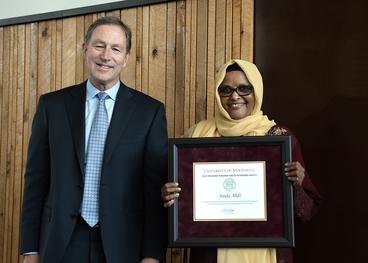
Saida Abdi, assistant professor, School of Social Work, College of Education and Human Development, University of Minnesota Twin Cities, was recruited to the University from Children’s Hospital of Boston in 2019 based on her work related to mental health services for immigrant children and their families. During her time at the University, Abdi has proven to be a remarkably gifted scholar (12 journal articles, $2.8 million in grants), educator, and mentor of graduate students and researchers. Abdi is the principal investigator on the Collaborative for Resilient Kids and Families in Minnesota, a partnership between the School of Social Work, Somali American Parents Association, Comunidades Latinas Unidas En Servicio, Minneapolis Public Schools, and Boston Children’s Hospital Trauma and Resilience Center. The goal of this project is to provide trauma-responsive, culturally, and linguistically relevant mental health support to East African and Latinx children, youth, and their families in Minneapolis. Abdi’s commitment to serving others, stemming from her personal experience as a refugee from East Africa, is reflected in her devotion to advising, mentoring, and student development. Abdi is a strong and effective advocate of student voices and student professional development as demonstrated by her role as co-founder and facilitator of the BIPOC Affinity Group for Students (2020-21), as well as her current leadership role (2022-present) as one of the tri-chairs of the Equity, Justice and Inclusion (EJI) Committee. EJI is comprised of about 60 members, including faculty, staff, and students, dedicated to promoting social justice through educational events, service, and special projects. Her work is a reflection of her commitment as a teacher, clinician, clinical trainer, researcher, and spokesperson for marginalized communities, particularly refugee and immigrant youth. In the words of one of her letter writers, Abdi’s colleagues, both at the University and across the country, appreciate not only her expertise, but her ability to step in, get things done, and guide those who are uncertain – in areas that can be quite sensitive. Her unwavering dedication to the needs and best interests of children and families is truly inspiring.”
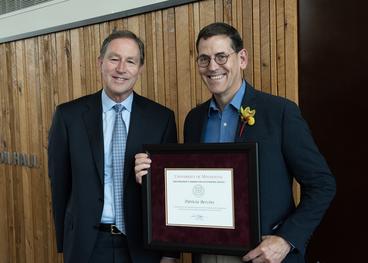
Patricia Berzins, hospital administrator and director of operations, Veterinary Medical Center, College of Veterinary Medicine, University of Minnesota Twin Cities, earned her bachelor's degree in animal science from the University in 1979 and began her career at the VMC in 1980 as an animal attendant. Berzins was gradually promoted through the various job levels for veterinary technicians in recognition of her efficiency, problem solving skills, and ability to lead. Berzins is responsible for quality improvement and quality assurance within the VMC, a large, complex 24/7 veterinary clinical operation that involves over 34,000 admissions per year and operates with an annual budget of $40 million. When challenging problems arise, she works with persistence and tenacity to find and implement the best solution. Examples include spearheading the VMC transition to an electronic medical record system in 2001 (and two new medical record systems since), as well as bringing in a new program called TeamSTEPPS, which is widely used in human hospitals and other industries. The VMC was the first veterinary hospital in the world to implement this program in large part due to Berzins’ ideas and willingness to try new things. Berzins has served as a phenomenal mentor to many over the years, including veterinary technicians, technician supervisors, IT specialists, and veterinarians. The trust that the college and faculty have placed in her is well earned through continuous personal and professional development, creative problem solving, trailblazing innovation, extremely hard work, and true grit. Even after 43 years at the University, she continues to go above and beyond in everything she does. According to one letter writer, Berzins is a servant leader who “works tirelessly to improve the lives of the students, the employees, and the pets that are in our care.” The stability, guidance, and leadership she has provided while serving CVM has changed the lives of those around her in immeasurable ways."
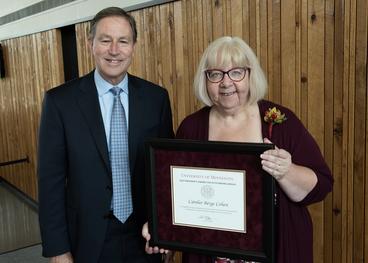
Carolee Berge Cohen, associate director, Academic Resources Information Technology, Academic Support Resources, University of Minnesota Twin Cities, has worked at the University for over 40 years, focusing mainly on student accounts receivables, student financials technology, and financial aid technology. She was instrumental in the University’s implementation of PeopleSoft in 2000 and has been a major part of each system upgrade that has taken place through present day. Her work has touched hundreds of thousands of lives: any student that has received financial aid or their University bill, for example, has indirectly experienced the high level of work that Cohen has helped to implement. Through her technical expertise and passion for the student experience, Cohen has led teams and projects to continually make improvements across numerous technical applications. Cohen is a tireless advocate on behalf of her team, her students, and the University as a whole. During the maelstrom of data requests and fee changes due to COVID-19, for instance, Cohen put in long hours and fought hard to keep expectations reasonable. More than just proving that she is a great manager, her actions during this time prove her dedication to the University. Her focus on making certain her team had the capacity to do things right ensured that audit findings were minimal and that students saw a coordinated update to their account. Outside of the University of Minnesota, Cohen has contributed her extensive knowledge and expertise in organizations such as the Higher Education User Group (HEUG), where she is known as a nationwide expert for PeopleSoft campus solutions for student information systems. She was recently inducted into the 2023 HEUG Hall of Fame given her demonstrated commitment to leadership, service, and contributions to the higher education community. According to one of her support letter writers, “Her on-going dedication, over-and-above work ethic, technical expertise, and servant leadership should be held up as the gold standard of University service. Day in and day out, Carolee does the work that keeps this organization running and improves the experience of every student, faculty, and staff.”
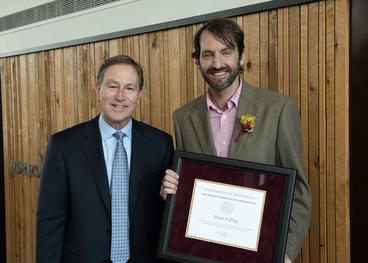
Matt Edling, managing director of the anthropology laboratories, Department of Anthropology, College of Liberal Arts, University of Minnesota Twin Cities, is responsible for ensuring that laboratory research involving faculty and graduate and undergraduate students proceeds smoothly and for facilitating the laboratory needs of numerous undergraduate courses. Edling has been an exemplary leader in making it possible for the University to be more accountable to communities who have had cultural materials extracted through research; by providing a supportive and safe research space for both faculty and students; and by mentoring students who will go on to be the leaders in research and collections management with a new, higher ethical bar for professional practice. Since 2018, Edling has been working, in partnership with Dr. Kat Hayes, with local tribal communities, faculty, and University personnel to repatriate thousands of objects and human remains that were collected by University faculty and students during excavations in the Mimbres region of New Mexico between 1928 and 1931. These efforts will bring the Department of Anthropology and the University into compliance with the 1990 Native American Graves Protection and Repatriation Act. Edling has provided an extraordinary degree of care and support for lab users, and in doing so has fostered the excitement, imagination, and dedication of many young researchers. While faculty and advanced graduate students most often design the research conducted in departmental labs, it is Edling who provides access and basic training, supervises as needed, and supports the student interns and assistants. Edling also created and annually co-instructs a course titled Managing Museum Collections, in which students learn collections management practice and ethics. In both this course and in his mentoring, Edling communicates clearly with aspiring museum professionals about the dire lack of diversity, equity, and access in the contemporary field, and foregrounds the kinds of changes needed to address that lack. According to one letter writer, “Edling makes all of our work – from the access to all we need, the cooperative problem-solving, working through the complex ethics of our collections history, to entanglement of research, teaching, and service – better. In his quiet way, no concern or collection is too small for him to give all of his considerable skill and effort to supporting it, and he has generously assisted departments and museums within and outside of the University to do the same.”
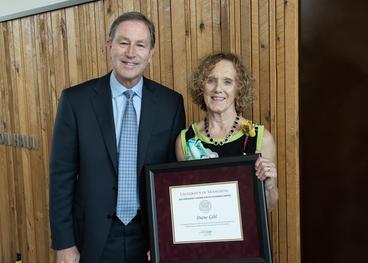
Diane Gihl, retired executive assistant, Office for Public Engagement, Office of the Executive Vice President and Provost, University of Minnesota Twin Cities, is admired and respected throughout the University of Minnesota system for her professionalism and unflagging service to the University, its people, and its mission. Gihl utilized her tremendous talents in her 31 years as a full-time employee serving six senior leaders at the University, playing a critical role that included everything from scheduling meetings, to event planning, to navigating complicated relationships and bureaucracies, enabling all she worked on behalf of to succeed in executing their collective responsibilities. The way and manner in which she carried out her complex duties was part of the inspiration for one letter writer’s doctoral dissertation in which they explored the role of staff who work in an “assistant to” role for senior leaders in higher education. Since her 2018 retirement, Gihl’s expertise continues to be in demand, as she is often tapped for help with special University projects, whether helping lead the onboarding processes for many University executives, to volunteering to take on the logistical work of hosting a national conference. Her knowledge of University policies and procedures, combined with her ability to work with accuracy, speed, and grace under pressure, has earned her a reputation as one of the University’s most sought after executive assistants. Gihl is a loyal booster of Gopher basketball, a long-time board member and devotee of the University’s Recreation and Wellness Center, an active member in the University Retirees Association, and now—in retirement—a part-time casual employee who gives far more than her allotted 15 hours a week. As one letter writer stated, “Her greatest service is and has been to so many of us faculty, staff, and students who she gladly takes under her wing, offers support to, connects to others, and generally grants us wonderful advice through her experience and wisdom.”
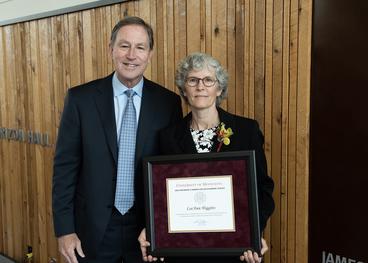
LeeAnn Higgins, research assistant professor, Department of Biochemistry, Molecular Biology and Biophysics, Medical School and College of Biological Sciences, University of Minnesota Twin Cities, was recruited to the University in 1999 as a postdoctoral researcher. She brought unique expertise in the use of advanced mass spectrometry instrumentation to study proteins, an approach commonly called “proteomics.” Working as the lone expert in this area at the time, Higgins skillfully implemented these advanced methods and began working with University faculty who could benefit from this technology in their research. Her skill and dedication led to the eventual creation of the Center for Mass Spectrometry and Proteomics (more recently renamed as the Center for Metabolomics and Proteomics). Another example of her dedication includes her ability to help with experimental design of projects “hunting” for biomarkers in children with rare diseases. Higgins is able to assist in all aspects of experimental design, including establishing cohorts, samples storage, sample processing, and data analyses, in spite of the fact that she is only responsible for a fraction of this process. She single-handedly is responsible for generating several biomarkers in this work which have been proven and published to be associated with rare disease outcomes. Higgins has always been willing to go above and beyond to ensure that projects are successful and the data she delivers to researchers are of the highest quality and integrity. Because of her dedication, Higgins has spent many weekends and late nights in the laboratory troubleshooting operating problems. She always remains resilient and optimistic, even in the face of significant challenges that may come up in the course of research. Higgins combines her technical skills with a wonderful caring personality that exudes collaboration and community. In the words of one letter writer, “It is LeeAnn’s willingness to go above and beyond with her time, energy, and expertise at the University that sets her apart from everyone else. I know of no other person with her dedication, drive, and passion for science.”
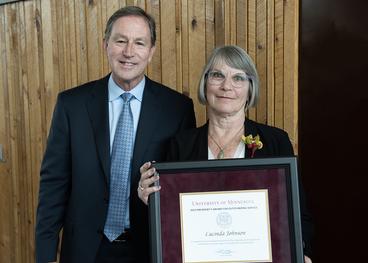
Lucinda Johnson, senior research fellow, Natural Resources Research Institute, University of Minnesota Duluth, is a talented and accomplished scientist who is admired and respected by her peers, a forward-thinking researcher, and an inspiration for the local and broader scientific community. Her leadership at NRRI continually pushes the field of aquatic and environmental science forward, and her engagement and service at the state, federal, and international levels bring recognition to the excellent research conducted at NRRI and the University of Minnesota. She has pursued internationally recognized aquatic ecosystem research programs, mentored many students and colleagues, worked to evolve her institutional leadership, broadened her expertise and perspectives, contributed significantly to cross-system collaborations and centers, and supported the journey to create the next-generation version of the NRRI and its leaders. Johnson was a pioneer in the application of geographic mapping system (GIS) technologies for the translation and communication of complex ecosystem data, just one example of her determination to propose forward-thinking research in anticipation of state, regional, and national natural resource needs. One recent example of her pioneering spirit is the development of the Minnesota Natural Resource Atlas which provides free and easy access to extensive layers of data regarding the state’s natural resources; users can access, visualize, and analyze the data without the need for GIS skills. Johnson has mentored multiple undergraduate and graduate students, post-docs, and research colleagues at NRRI and across the University system. She is described by a former student as someone committed to staff career development, the success of early career scientists, and mentorship to students. One of Johnson’s most lasting contributions at the University is the creation of the Institute on the Environment (IonE). She was a critical member of a 12-person working group that established IonE, a group commissioned by the provost to design an interdisciplinary, intercollegiate, and inter-campus unit to advance, celebrate, support, and catalyze environmental scholarship and teaching. Johnson serves on multiple boards, commissions, and committees. She is the vice chair of the United States Environmental Protection Agency’s (USEPA) Board of Scientific Counselors, co-chair of the Great Lakes Science Advisory Board Science Priority Committee of the International Joint Commission for the Great Lakes (US and Canada), and a selected member of the Governor’s Advisory Council on Climate Change. Her nominator wrote, “Dr. Johnson’s exemplary and ground-breaking research accomplishments, her productive teaching and mentorship contributions, her strategic leadership development, and her stature on the state, national, and international stages on behalf of NRRI and the University of Minnesota clearly exceed expected contributions and set an example for the next generation of contributors.”
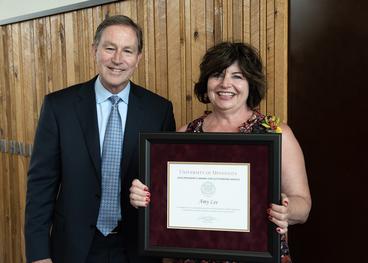
Amy Lee, professor, Department of Writing Studies, director of First-Year Writing, and director of Faculty Engagement for Student Readiness, College of Liberal Arts (CLA), University of Minnesota Twin Cities, joined the University in 1999. In her many leadership roles, Lee has supported access and success for an increasingly heterogeneous population of students and been instrumental in preparing graduates for the cognitive and intercultural complexity of the 21st century, all while deeply committed to developing the capacity of scholars, practitioners, and administrators to engage and value diversity. Her drive to continuously center students, equity, and excellence supports the University community in translating vision into strategic action. As director of the First-Year Writing program, Lee’s vision has led to the hiring of quality instructors who were drawn to the program due, in part, to her innovations, including the development of eight guiding frameworks in the curriculum that prioritize student equity and inclusion alongside core rhetorical principles of writing instruction. Lee has revitalized professional development paths and opportunities for the CLA instructors that she supervises, improving the annual review processes, opportunities for instructor check-ins and observations, ongoing training and support, and reflective practice groups. In her various leadership roles, Lee has helped to organize workshops on anti-racist, inclusive, and equitable teaching. Her service to the University includes membership on the Senate Judicial Committee, the Council on Liberal Education, and the Advisory Board for the Academy of Distinguished Teachers. The nomination letter included the following quote from a colleague of Lee’s: “Anyone at the University of Minnesota who has been lucky enough to work with Amy Lee knows the unique and valuable perspective she brings to all of the work she does at the U. Full of energy, insight, innovation, and creativity, Amy is constantly looking for ways to improve intellectual life at the University, with a strong sense of commitment and integrity. Her enthusiasm and positivity are contagious, and she inspires others to join in making the U a better place to work, study, and learn.”
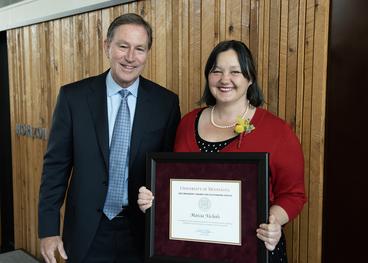
Marcia D. Nichols, associate professor, Center for Learning Innovation, University of Minnesota Rochester (UMR), joined the University in 2010. As one of the early faculty members of UMR, Nichols, while managing her teaching and research responsibilities, attended to the heavy lifting of establishing culture, practices, guidelines, and norms for a thriving, new campus focused on undergraduate education. She has provided an extraordinary level of leadership and service to the University and has been a key leader in establishing systems of faculty governance and faculty advocacy at UMR. Nichols has been a mainstay of the Rochester campus, serving in almost every capacity as a mentor to instructors and faculty, on hiring committees, creating curriculum, building campus committee processes and departmental roles, and on and on. Her commitment to the campus is outstanding. Nichols distinguished herself in the spring of 2020 when she demonstrated willingness to take on the outsized problems facing the University, including the COVID-19 pandemic, civil unrest, building renaming controversies, changing faculty retirement benefits, and faculty salary reduction. She routinely addressed conflict by designing solutions to problems based on collaboration, advocacy, and conflict management. Nichols has long been at the helm of building the governance infrastructure for UMR. She is currently serving a four-year term as chair of the Directorship Committee, a system of shared governance with representatives from both tenure-stream faculty and P&A faculty-like staff. She has worked tirelessly with collaborators to affect changes to the charge and bylaws of the Directorship Committee to improve decision-making, communication, and departmental procedures for annual review practices. Additionally, as chair of the Directorship Committee, Nichols represents faculty in a variety of contexts, meets and consults with senior leadership and faculty on issues and policies, steers and coordinates faculty committees, brings new policies and procedures to the All Faculty (UMR’s faculty governing body), has executive responsibility including chairing the annual reviews of tenure-stream faculty, and leads the All Faculty and its meetings. Her astounding record includes service on 55 unique department-level committees, working groups, and task forces. She has also served on governance committees at the University-wide level, including the University and Faculty Senates and the Faculty Consultative Committee. One letter-writer wrote: “Nichols is not afraid of working through conflict and attempts to do so in ways that build bridges toward our common goals. She has dedicated herself tirelessly and unselfishly to making UMR a campus that students, faculty, and staff are proud of.”
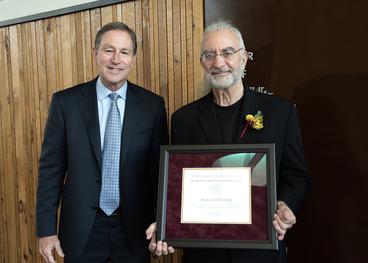
Howard Oransky, director, Katherine E. Nash Gallery, Department of Art, College of Liberal Arts, University of Minnesota Twin Cities, has consistently exceeded expectations since he joined the University. Oransky is the consummate collaborator, building partnerships within the University and with other institutions and communities. The exceptional quality of all of Oransky’s projects, featuring local, national, and international artists, as well as the artwork of students, staff, and faculty; his mentorship of undergraduate and graduate students and his service to many high school and cultural art communities; and his creation of a diversity scholarship for first-year students in the Department of Art are defining features of his service to the University. Through a combination of vision, determination, compassion, and a deep knowledge of contemporary art, Oransky has transformed the Katherine E. Nash Gallery and the Department of Art’s overall exhibition program into a nationally and internationally recognized venue. One of the stand-out exhibitions in a list of many powerful and innovative projects organized by Oransky was Covered in Time and History: The Films of Ana Mendieta, presented in 2015. With funding provided by the National Endowment for the Arts, this groundbreaking exhibition traveled to museums in California, Florida, Sweden, Germany, and France, with over 200,000 people attending the exhibition. The exhibition was reviewed hundreds of times, and was twice selected as among the Best Exhibitions of 2016 by the journal Artforum. In 2015, Oransky also initiated a partnership between the Department of Art, the Weisman Art Museum, and the Art Educators of Minnesota to bring the annual Minnesota Scholastic Art Awards program to the University of Minnesota. Now in its ninth year at the University, this program has featured the work of approximately 4,500 high school students. In addition to his curatorial duties, Oransky also supervises and mentors staff, graduate teaching assistants, undergraduates interns, gallery attendants, and many students who have gone on to pursue careers in the art museum field. Oransky’s students and mentees hold positions at the Minnesota Museum of American Art, the Boston Athenaeum, and the Katherine E. Nash Gallery. One letter writer noted: “Howard has been an exemplary ambassador for the University, working tirelessly to represent and to model the world-class research and creative practice of the faculty, staff, and students nationally and internationally.”
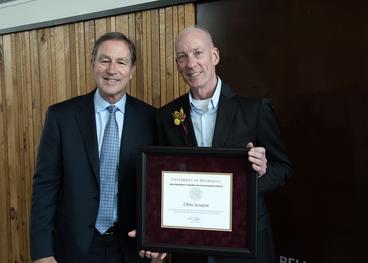
Chris Scruton, systems analyst, Academic Technology, Office of Information Technology, University of Minnesota Twin Cities, has become known at the University as an integration technical expert, one who can be depended on to dig into important and intricate details. Scruton has contributed to the University’s mission by serving as an expert for University-wide technical integrations, including playing a pivotal role in the successful transition from Moodle to Canvas (the University’s past and current course management systems) and onboarding every college and campus into the system. Scruton’s work has supported both “tried and true” as well as innovative approaches to teaching and learning that are needed for the academic enterprise to thrive. Over the last several years, Scruton has created a vetting process for learning tools that instructors have requested be integrated into the University’s central Learning Management System (LMS). This process allows the University to safely integrate tools that support instructors in their teaching innovations, all while ensuring the University’s technology ecosystem remains secure. The work that Scruton is leading is the foundation for the University’s learning analytics platforms, which are becoming transformative tools for both faculty and students and their academic success. He is incredibly adept at advocating for the most stable and easy-to-use academic technology tools and services for the University community. During the transition between course management systems, Scruton’s vision allowed the University to take full advantage of the new tool (Canvas) which resulted in a much improved experience for instructors and students. Scruton cares deeply about the teaching and learning mission of the University. He taught for years while in graduate school and has supported hundreds of instructors throughout his career. It can be easy for a group of technologists to develop a solution to a problem that doesn’t take into consideration how most instructors do their day-to-day work. Scruton’s experience from the teaching side of the equation allows him to effectively discuss issues with technical and non-technical University members alike, providing understandable and thoughtful solutions that can be successfully implemented. Outside of his regular duties and service to the University, Scruton has done pivotal work with Unizin, a consortium of higher education institutions with a focus on digital learning technology and student success; the Big Ten Academic Alliance; has volunteered as a web designer and HTML author for numerous groups; and has designed programs, posters, and dinner menus for the Association of Teachers of Technical Writing national conferences. One letter writer wrote that they are constantly impressed by Scruton’s knowledge, thoughtfulness, and dedication, as well as his ability to put such a disparate set of pieces of digital learning technologies together in a way that soundly prepares the University for the future.
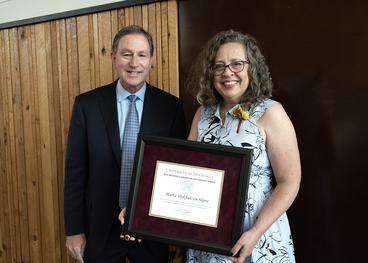
Marta Dykhuizen Shore, lecturer, Division of Biostatistics, School of Public Health, University of Minnesota Twin Cities, joined the University in 2017. While Shore’s appointment assigns 90% of her effort to classroom instruction, the extent of her service activities goes far beyond the remaining 10%. She is passionate about amplifying student voices, advocating for their needs, providing equitable opportunities, and supporting their success. She is an innovative, engaging and highly respected instructor who strives to make her courses accessible to all. In addition to teaching introductory biostatistics courses (itself not an easy task with class size often 100+ students), Shore’s contributions to the SPH are vast. Shore serves as a mental health advocate, a role that is completely voluntary and that she proactively sought out. During the height of the COVID-19 pandemic and to help address the continuing effects of tragedy and loss on student mental health, Shore began liaising with the CARE Program and other resources on campus to provide grief counseling and other resources. In addition, Shore’s student mental health advocacy now includes monthly check-in meetings with other Mental Health Advocates within the School of Public Health. Shore has also shown her passion for service through her outstanding contributions related to DEI and antiracism. Since SPH launched its Strategic Plan for Antiracism (SPAR) in July 2021, Shore has prioritized the school’s goal of making diversity, equity, inclusion, justice, and antiracism central to its operations and mission. She serves as a member of multiple committees, including: the SPH Diversity, Equity, and Inclusion Antiracism Action Team; the Biostatistics Diversity, Equity, and Inclusion Committee; the Biostatistics Community Outreach and Engagement Committee; and the SPH Equity, Diversity, and Inclusion Training Team. Shore also believes in challenging a commonly held belief in academia that using big words proves one's expertise. Instead, she invites colleagues and students to stand up to racism by using language that is accessible to all. Shore’s contributions to SPH also include organizing a Division of Biostatistics book-club focused on the role of statistics and data science in perpetuating inequalities, helping the division to center DEI and antiracism as important aspects of the faculty interview process, and working to create learning modules highlighting the role of statisticians in perpetuating health inequalities. Outside the University, Shore has played a leading role in developing, and now managing, a partnership between SPH and St. Paul Public Schools. This partnership exposes students in grades 9-12 to data science, environmental health science, and public health curricula, with the goal of demystifying biostatistics and offering new pathways to public health careers, especially for students that historically have not been exposed to these opportunities. The program Shore and colleagues developed builds goodwill toward the University, and provides SPH Biostatistics graduate students service and teaching opportunities. One letter writer wrote: “Marta’s service to the SPH community is undeniable and her commitment to our students and advancing antiracism is genuine, remarkable, and will undoubtedly make a lasting impact on this institution and the students it serves.”